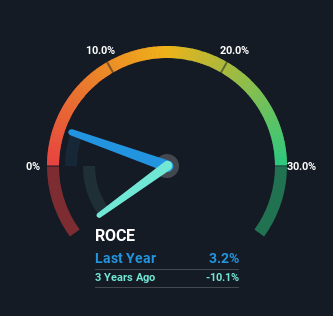- United States
- /
- Hospitality
- /
- NYSE:H
Returns On Capital Signal Tricky Times Ahead For Hyatt Hotels (NYSE:H)

If we want to find a stock that could multiply over the long term, what are the underlying trends we should look for? Amongst other things, we'll want to see two things; firstly, a growing return on capital employed (ROCE) and secondly, an expansion in the company's amount of capital employed. Put simply, these types of businesses are compounding machines, meaning they are continually reinvesting their earnings at ever-higher rates of return. However, after briefly looking over the numbers, we don't think Hyatt Hotels (NYSE:H) has the makings of a multi-bagger going forward, but let's have a look at why that may be.
Return On Capital Employed (ROCE): What Is It?
For those who don't know, ROCE is a measure of a company's yearly pre-tax profit (its return), relative to the capital employed in the business. The formula for this calculation on Hyatt Hotels is:
Return on Capital Employed = Earnings Before Interest and Tax (EBIT) ÷ (Total Assets - Current Liabilities)
0.032 = US$270m ÷ (US$12b - US$3.4b) (Based on the trailing twelve months to March 2024).
So, Hyatt Hotels has an ROCE of 3.2%. Ultimately, that's a low return and it under-performs the Hospitality industry average of 10%.
View our latest analysis for Hyatt Hotels

Above you can see how the current ROCE for Hyatt Hotels compares to its prior returns on capital, but there's only so much you can tell from the past. If you'd like, you can check out the forecasts from the analysts covering Hyatt Hotels for free.
How Are Returns Trending?
On the surface, the trend of ROCE at Hyatt Hotels doesn't inspire confidence. To be more specific, ROCE has fallen from 4.1% over the last five years. However it looks like Hyatt Hotels might be reinvesting for long term growth because while capital employed has increased, the company's sales haven't changed much in the last 12 months. It may take some time before the company starts to see any change in earnings from these investments.
While on the subject, we noticed that the ratio of current liabilities to total assets has risen to 29%, which has impacted the ROCE. Without this increase, it's likely that ROCE would be even lower than 3.2%. While the ratio isn't currently too high, it's worth keeping an eye on this because if it gets particularly high, the business could then face some new elements of risk.
The Bottom Line On Hyatt Hotels' ROCE
In summary, Hyatt Hotels is reinvesting funds back into the business for growth but unfortunately it looks like sales haven't increased much just yet. Although the market must be expecting these trends to improve because the stock has gained 98% over the last five years. But if the trajectory of these underlying trends continue, we think the likelihood of it being a multi-bagger from here isn't high.
On a final note, we found 4 warning signs for Hyatt Hotels (1 shouldn't be ignored) you should be aware of.
For those who like to invest in solid companies, check out this free list of companies with solid balance sheets and high returns on equity.
Valuation is complex, but we're here to simplify it.
Discover if Hyatt Hotels might be undervalued or overvalued with our detailed analysis, featuring fair value estimates, potential risks, dividends, insider trades, and its financial condition.
Access Free AnalysisHave feedback on this article? Concerned about the content? Get in touch with us directly. Alternatively, email editorial-team (at) simplywallst.com.
This article by Simply Wall St is general in nature. We provide commentary based on historical data and analyst forecasts only using an unbiased methodology and our articles are not intended to be financial advice. It does not constitute a recommendation to buy or sell any stock, and does not take account of your objectives, or your financial situation. We aim to bring you long-term focused analysis driven by fundamental data. Note that our analysis may not factor in the latest price-sensitive company announcements or qualitative material. Simply Wall St has no position in any stocks mentioned.
About NYSE:H
Hyatt Hotels
Operates as a hospitality company in the United States and internationally.
Solid track record and good value.
Similar Companies
Market Insights
Community Narratives




